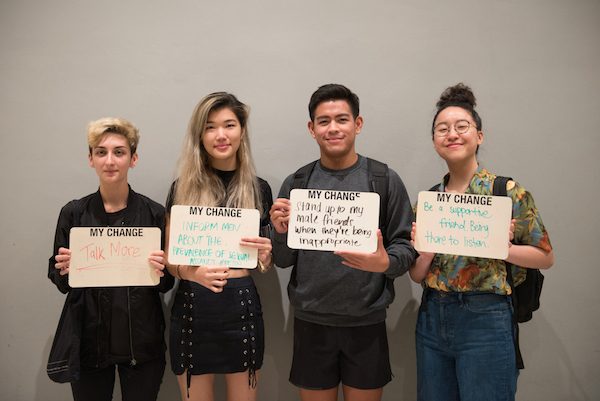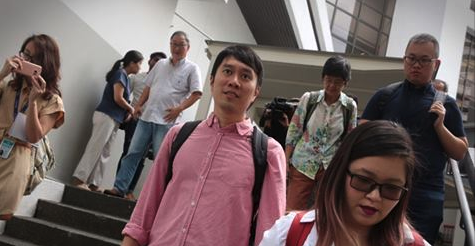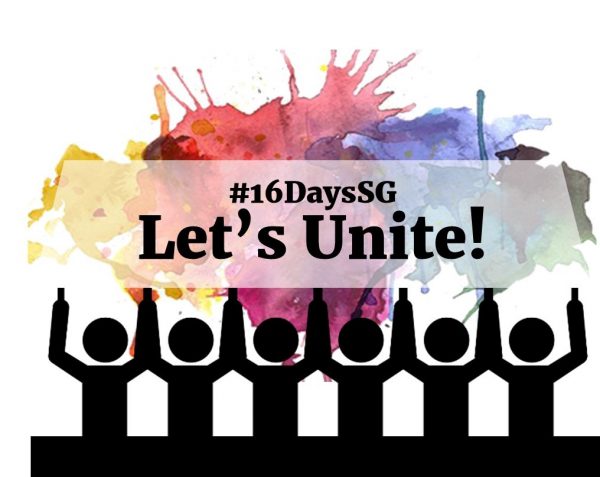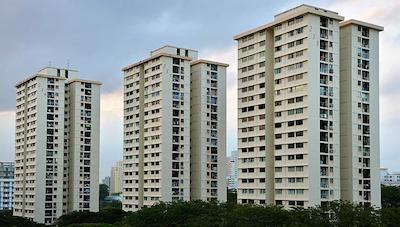By Reetaza Chatterjee, AWARE volunteer
 On 25 November, in line with the International Day for the Elimination of Violence against Women, more than 70 people attended a roundtable on violence against women in Singapore, and listened to firsthand accounts from three survivors about their personal experiences and recovery from sexual violence.
On 25 November, in line with the International Day for the Elimination of Violence against Women, more than 70 people attended a roundtable on violence against women in Singapore, and listened to firsthand accounts from three survivors about their personal experiences and recovery from sexual violence.
Anisha Joseph, manager of the Sexual Assault Care Centre (SACC), opened up the session by highlighting the importance of changing the narrative that sexual assault is just sex without consent. “Whether it’s verbal, visual or physical, sexual assault is an act of violence that uses sexualised behaviour to exert power and control,” she explained.
This set the stage for a powerful discussion. A survivor spoke about the social isolation she experienced when she came forward with the story of her assault, receiving comments such as “stop making things up” and “what were you wearing?” from her social circle. Another survivor of child abuse, spoke about how she initially internalised the abuse as “love and affection”, though it quickly turned into feelings of shame and self-blame as she grew older.
Another survivor shared how male colleagues would casually address her using terms such as “sweetie” and “baby” in professional settings, ask her out on dates and subsequently not speak to her for months when she rejected their offers. She was repeatedly told to “get used to” such behaviour because that was the reality for a “pretty young thing” like her. After she went public with her most recent experience of sexual harassment, she was ostracised and shunned by her colleagues who accused her for not being able to take “jokes”. Not only did she have to cope with the trauma of the harassment, she also had to deal with the aftermath of the abuse that she faced from her colleagues and online.
The survivors’ stories illustrated how seemingly harmless everyday language contributes to our understanding of sexual violence. Too often, we are quick to make excuses for the perpetrator – “boys will be boys”, “take it as a compliment” or “maybe she gave him the wrong idea”. Victim-blaming is common, which leads to an important question: we keep asking survivors of sexual violence to speak out – but are we, as a society, ready to listen?
To quote one speaker, “The more you talk about [sexual violence], the more people will realise that this is a reality.” We have seen how when one survivor speaks up, it makes other survivors feel less alone and also empowers them to add their voices to the conversation. However, there are plenty of survivors out there who do not feel ready to share their lived experience, but that does not mean that their experience of living through sexual violence is not real.
We cannot just rely on survivors alone to keep the conversation going. As allies, the responsibility to speak out against sexual violence and create a community of support for survivors falls on us. We need a cultural shift where we are no longer debating the lived experiences of survivors, but instead educating ourselves of the ways in which we can respond to them in an empathetic manner.
The Let’s Unite! #16DaysSG campaign provides a platform for individuals and organisations to take action to end violence against women – whether it is through simple actions such as applying the Let’s Unite! overlay to your Facebook profile picture or going a step further to collaborate with AWARE to organise a Sexual Assault First Response training session in your workplace or community. Learn more about the campaign at www.tinyurl.com/16DaysSG.
If you or someone you know has experienced any form of sexual assault or harassment, you can reach out to SACC through the helpline (6779 0282) or email sacc@aware.org.sg.
*Let’s Unite is inspired by the 16 Days of Activism against gender-based violence, a global campaign that calls on individuals, groups and organisations to stand together by pledging their support and taking action from 25 November, the International Day for the Elimination of Violence against Women, to 10 December, Human Rights Day.




 Single parents who signed a parliamentary petition urging reform of public housing policies are disappointed with the lack of action by policy-makers.
Single parents who signed a parliamentary petition urging reform of public housing policies are disappointed with the lack of action by policy-makers.



 After the online movement #metoo papered social media feeds with women’s experiences of sexual violence, the
After the online movement #metoo papered social media feeds with women’s experiences of sexual violence, the  For some time, AWARE has sought changes to HDB rules to improve housing access for single-parent families. MND has often responded that HDB exercises “flexibility” in favour of such families on a
For some time, AWARE has sought changes to HDB rules to improve housing access for single-parent families. MND has often responded that HDB exercises “flexibility” in favour of such families on a